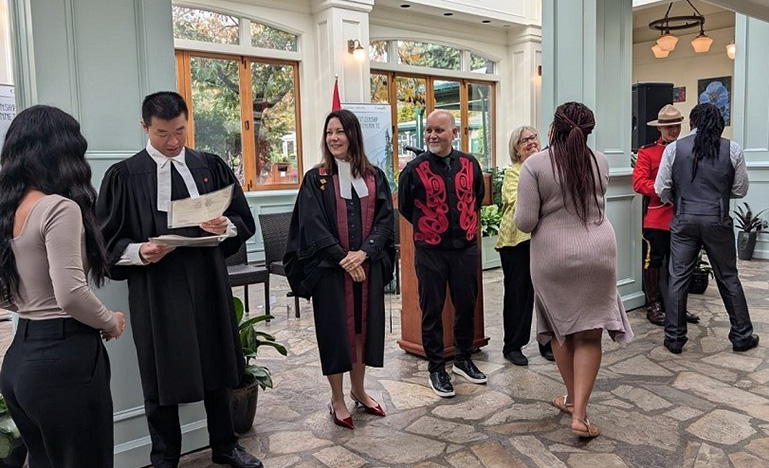Truth, Reconciliation and Canada’s Newcomers
Ensuring new Canadians recognize how Indigenous peoples enrich and shape an evolving Canada

During the 12 years I conducted hearings in the Indian Residential Schools Alternative Dispute Resolution and Independent Assessment Processes, I was fortunate to meet Isabel Jackson, Counsel, Department of Justice Canada, who has asked me to provide an update about Reconciliation with Indigenous peoples in the context of Citizenship. It is a pleasure to highlight some of the significant developments in recent years.
In 2021, a critical milestone was achieved toward the goal of ensuring new Canadians recognize the important contributions of Indigenous peoples, and to affirm Canada’s commitment to Reconciliation and a fundamental and profound shift in the relationship with Indigenous peoples. An Act to amend the Citizenship Act (Truth and Reconciliation Commission of Canada's call to action number 94), S.C. 2021, c.13 received Royal Assent on June 21, 2021, National Indigenous Peoples Day.
This legislation inserted new language into the Oath of Citizenship to address the spirit of Call to Action number 94. As a result, the oath sworn or solemnly affirmed by all candidates for Citizenship includes the following wording:
… And that I will faithfully observe
The laws of Canada
Including the Constitution
Which recognizes and affirms
The Aboriginal and treaty rights of
First Nations, Inuit and Métis peoples
… Que j'observerai fidèlement
Les lois du Canada
Y compris la Constitution
Qui reconnaît et confirme les droits
Ancestraux ou issus de traités
Des Premières Nations, des Inuits et des Métis…
There are currently nine Citizenship Judges in Canada. We were all extremely proud to be part of this impactful change. From that day forward, every candidate for Citizenship would repeat the new Oath of Citizenship, the final legal requirement to become a Canadian Citizen.
Learning, understanding, and respect are so important to truth and Reconciliation. There is an invaluable opportunity in relation to newcomers and Reconciliation in the remarks delivered at every citizenship ceremony, and each community outreach session promoting citizenship. Recognizing this, I speak to those who are new to our country about the many ways Indigenous peoples have enriched and shaped an evolving Canada. I encourage them to learn more, and to embrace our shared responsibility to take an active role in Reconciliation.
We are honoured to have Indigenous representatives attend citizenship ceremonies to share their traditional knowledge in officially opening and closing the ceremonies, and as guest speakers. In all of my experiences, this has been a beautiful part of the ceremony. Being welcomed by an Indigenous person is particularly meaningful to new Canadians, and an important part of Reconciliation.

Citizenship Ceremony at Butchart Gardens at which Adam Olsen was the Indigenous representative.
In June of 2024, Immigration Refugees and Citizenship Canada launched a video showcasing the richness of Indigenous peoples in Canada and their histories, cultures and perspectives. The video is shown at all citizenship ceremonies, virtual and in-person, at which broadcasting a video is possible. The title of the video is: Welcome, there is room / Bienvenue, il y a de la place.
This excellent video was created and produced by and with Indigenous people to increase Indigenous inclusion at citizenship ceremonies across the country. It is designed to inspire discussion and conversation amongst all people, and the goal is that within this dialogue, relationships can be strengthened.
Although significant strides have been made, there is still much to do on the road ahead. In these challenging times throughout the world, we must re-dedicate ourselves and continue forward unwaveringly with our Reconciliation efforts.




